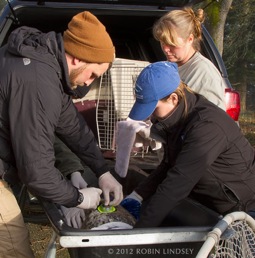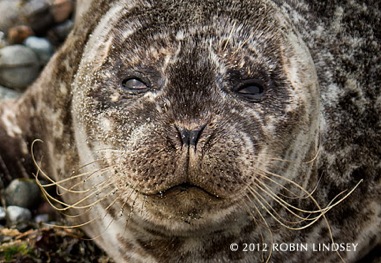Mar 2012
Local young people committed to doing good for animals
Mar/29/12 05:47 AM
This week, Seal Sitters was invited to make a presentation to two local West Seattle Schools - Madison Middle School and Schmitz Park Elementary. Each year, students across the country collect pennies in a Penny Harvest Drive, with each school typically raising $1000. A panel of students is selected to nominate local non-profits and follow up with interviews and final recommendations for distribution of funds. We are so grateful and honored to be nominated for such an award. These dedicated young people are a true inspiration - we hope they join Seal Sitters at our upcoming May training (to be announced). Yesterday at Schmitz Park school in addition to Seal Sitters, a feral cat rescue group talked about their work fostering feral cats and kittens and neuter/spay program. They brought in 5 adorable black kittens to show the kids. Laughing, we said that NOAA won’t let us bring seal pups into the classroom and that we never get to touch or snuggle with our fuzzy friends - and the kids were shocked to hear that people actually pick up pups from the beach, mistakenly thinking a seal is better off in their bathtub. We stressed the importance of keeping people and dogs away for the safety of both the public and the pup - they are wild animals and can bite - and, of course, dogs can injure and kill seal pups.
Many thanks to the kids for being so passionate about our many animal friends and nominating us for a possible grant! Last year, we were the benefactor of a generous Penny Harvest Grant from Schmitz Park which paid the costs for many months of Seal Sitters’ dedicated phone hotline. With no Federal or State funding, we depend on donations to cover the many expenses to continue our work.
Many thanks to the kids for being so passionate about our many animal friends and nominating us for a possible grant! Last year, we were the benefactor of a generous Penny Harvest Grant from Schmitz Park which paid the costs for many months of Seal Sitters’ dedicated phone hotline. With no Federal or State funding, we depend on donations to cover the many expenses to continue our work.
Seal Sitters protect special pup
Mar/28/12 08:12 PM
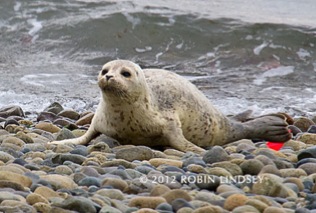
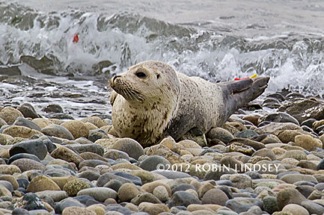
Seal pup Cassi has been using Constellation Park to rest over the past few days; so with two active pups our volunteers have been putting in extremely long hours. Our rookie volunteers from the early March training have been getting lots of varied experience the past couple of weeks. Today we got a bit of a break from beach duty, as we didn’t spot either weaned pup on shore.
Busy week for seal pups and new volunteers
Mar/23/12 11:54 PM
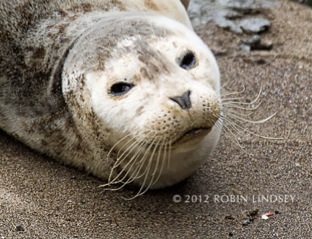
On Tuesday, we received a call about a pup at Jack Block Park. Our responder found the pup on the small protected beach, where he rested until dark. The pup returned to the beach on Wednesday and, due to his close proximity to the overhead sidewalk, we established a small perimeter to keep people from standing and talking directly above him. 10-year-old Casey, a brand new volunteer doing a shift with her mom, named the pup Weasley (photo above). This was Casey’s first day on the job and she was filled with excitement. We asked Casey her thoughts on seal sitting: “I wanted to be a seal sitter because I just love animals and because I want to help them in the world. I think all animals are amazing and seals are super cool and adorable too!” Well, we think Casey is super cool and adorable, too!
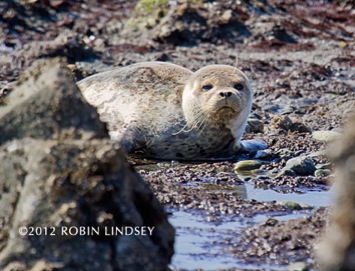
Our second pup of the day hauled out south of the Fauntleroy ferry. A mom walking the beach with her two small children noticed the pup resting in the shadows underneath a dock. He was alert with decent body weight for a wild weaned pup. Volunteers taped off a section of beach so that he could try to get some rest. This particular beach has issues with off leash dogs and our volunteers diverted two dogs in the time that we were there. The dog owners were extremely cooperative once they realized there was a seal pup on the beach. This little seal, nicknamed Shadow (photo below), was finally able to relax and settle in for a nap as the sun began to sink over the Olympics. It doesn’t get much better than protecting a vulnerable pup while ferries glide back and forth on cobalt waters - a simply stunning day.
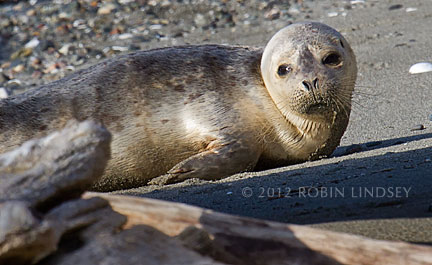
Harbor porpoise dies off Alki
Mar/18/12 07:52 AM
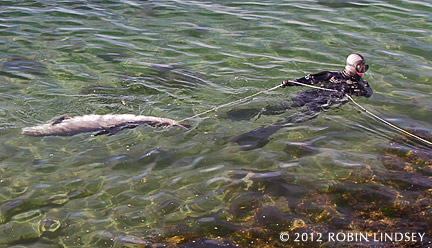
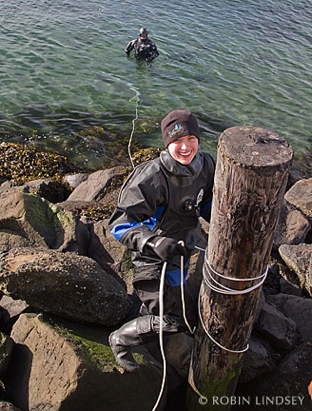
While the team from Cascadia Research (primary response team for cetaceans in South Puget Sound and the outer coast) and WDFW-MMI weighed the options with impending tide levels, it was determined the animal needed to be moved to an area with easier access than the steep rocks below the sea wall. Our investigator scaled the wall and towed the porpoise in the surf approximately 1/3 mile down to the sandy beach at Alki. Three volunteers assisted her in getting the estimated 150 lb. porpoise high up onto the beach, secured behind a large log overnight. Volunteers Christine and Raiana measured the porpoise at 5’8” while our responders documented the general condition with photographs. There were no obvious wounds evident in our preliminary examination of the porpoise.
To learn about harbor porpoise, click here.
UPDATE: 3/18 afternoon
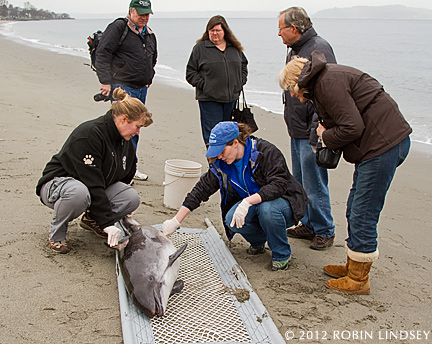
NECROPSY RESULTS UPDATE: 3/18 10:31 pm
Just in - The preliminary results of the necropsy reveal that the 3-5 year old female harbor porpoise suffered from a severe lung infection, with approximately 90% of each lung affected with pneumonia and markedly enlarged lymph nodes in the chest. The infection appeared to be systemic - not only causing damage to the chest , but had spread to the abdomen as well. Tissue samples will be sent to multiple laboratories to determine cause of the infection (fungal, bacterial, viral, parasitic or a combination of organisms). Final results can take a couple of months.
March Madness - Seal Sitters "blubberball" goes into overtime
Mar/11/12 08:29 PM
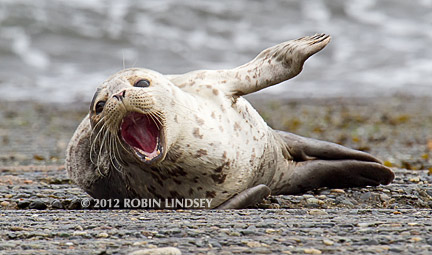
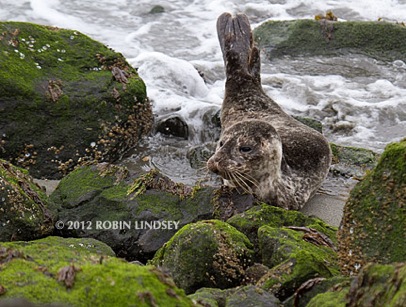
New volunteers anxious to help protect marine mammals
Mar/11/12 05:32 PM
Thanks to everyone who participated in our new volunteer training held March 3rd at Camp Long. Additionally, many thanks to Parks’ Sheila Brown for the use of the space and to Tully’s on Alki for the donation of their fantastic coffee. Fifty-two additional enthusiastic people are now trained to help keep the marine mammals of Puget Sound safe. There will be a followup on-the-beach training for those volunteers scheduled soon. Did you miss this training? If so, we will be offering our final training opportunity in May for the upcoming pupping season (Aug-Oct) and hope you will be able to join us. Please check back for updates.
Satellite Sandy cruising the San Juan Islands
Mar/11/12 09:54 AM
The seal pup that Seal Sitters MMSN rescued from the beach in August is now cruising the San Juans. We know this because after a lengthy rehab at PAWS Wildlife Center, Sandy was fitted with a satellite tag and released at a harbor seal haul out south of Tacoma. She has been moving all over the region - Olympia, Shelton, Vashon Island, 3 Tree Point, West Seattle, Richmond Beach and now the northern islands. You can follow Sandy’s lengthy travels on SeaDoc Society’s dedicated webpage and receive email alerts when a satellite picks up her signal. Her movements enable biologists to learn more about seal pup behavior. The glued-on tag will fall off when Sandy sheds her fur coat in a few months.
PUPDATE 3/12
The latest satellite hits show that Sandy has opted to head back south and was pinged at the northeast tip of the Olympic Peninsula. This is a bit of a relief since we wonder if she is able to tell the difference between the vocalizations of the transient orcas who eat seals and that of the residents who prefer salmon. With no mom to have taught her the ins and outs of life in the wild, she is trying to figure things out on her on.
PUPDATE 3/12
The latest satellite hits show that Sandy has opted to head back south and was pinged at the northeast tip of the Olympic Peninsula. This is a bit of a relief since we wonder if she is able to tell the difference between the vocalizations of the transient orcas who eat seals and that of the residents who prefer salmon. With no mom to have taught her the ins and outs of life in the wild, she is trying to figure things out on her on.
Seal pups galore in West Seattle
Mar/08/12 07:58 AM
